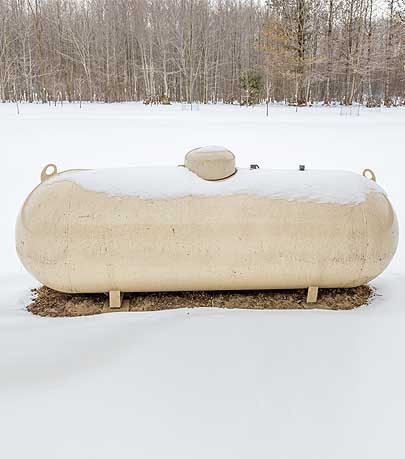Know What to Look For
Keeping People Safe Is Important To Us
LEAKS AND THE SMELL OF GAS
Always be sensitive to the slightest gas smell. Learn to recognize the odor of propane gas. To become familiar with the smell of propane, call your propane dealer for a Scratch-And-Sniff brochure, and ask to smell the propane when your propane dealer fills your tank.
Warning Signs
Below are some warning signs of a gas leak. If you smell propane, no matter how strong or weak the smell, treat it as a serious gas leak.
Examples of warning signs which may indicate a gas leak has occurred are:
- When the smell of gas lasts more than an instant after igniting stove-top burners.
- When the presence of a foul odor persists.
- When you cannot find the reason for the foul odor.
- What you think may be garbage, sewage, or a dead animal may be a serious gas leak.
- When you hear a hissing noise near a gas appliance, piping, or storage tanks and cylinders.
Odor Fade
NOTE:
- Under rare conditions, the chemical odorant (usually ethylmercaptan) that gives propane its distinctive smell can “fade” or diminish in intensity.
- On rare occasions, a leak can exist and the gas may not have an odor.
Odor fade can occur when there is an underground propane leak. The movement of gas through the soil can filter out the odorant.
Oxidation (a chemical reaction involving internal rust in the tank or cylinder) also causes odor fade. New and reconditioned tanks and cylinders that sit too long before being filled are prone to internal rust when moisture and air get inside.
Adsorption is another cause of odor fade. The odorant in leaking gas can adsorb (stick) on new or old building materials such as unpainted or untreated masonry, rough wall surfaces, and furniture fabrics and drapes, thus reducing the intensity of the odor. Adsorption of odorants can also occur on the inside walls of gas piping and static or periodically used propane storage containers and distribution systems.
Other Reasons Why You May Not Smell A Leak
In addition to odor fade, physical conditions may prevent you from smelling a leak.
Some physical causes are listed below:
- colds, allergies, or sinus congestion;
- use of tobacco, alcohol, or drugs;
- cooking odors and certain foods you eat;
- taking certain medications; the
- decline inability to smell, especially for older people;
- prolonged exposure to the odor of propane; and
- musty or damp smells, such as in a basement.
- The smell from a propane leak may not wake you when sleeping.
- If you are concerned that you may not be able to smell a propane leak, contact your family doctor.
SMELL TESTING FOR GAS LEAKS
All propane leaks are dangerous. Follow the Emergency Procedure found at the end of this report, which should be placed on or near your propane appliance.
If you suspect a leak, go to a neighbor’s phone and call your propane dealer to check your system for leaks. Your propane dealer is a trained professional.
There are three ways to test for a gas leak:
- the sniff test,
- the bubble test, and
- propane gas detectors.
NOTE:
As an added precaution, avoid relying solely on your sense of smell by installing propane gas detectors.
Sniff Test
Being heavier than air, leaking propane tends to collect initially in low areas. To check whether there is a leak using the sniff test, get down on your hands and knees and sniff close to the floor to smell for propane. If you smell propane, do NOT light a match. Follow the Emergency Procedure at the end of this report, which should be placed on or near your propane appliance.
Bubble Test
(This test should be performed by your trained propane service person.)
The bubble test enables you to check for leaks by applying a leak detector solution, or thick soapy water, on all connections. The leak detector solution can be obtained from your local propane dealer. Perform this test when installing and filling tanks or cylinders and any time you suspect a leak.
- Apply leak detector solution, or thick soapy water, to the connections between the cylinder valve and regulator outlet and/or any other connections you suspect, may be leaking.
- Slowly open the tank or cylinder valve and watch for bubbles.
- If bubbles appear, close the tank or cylinder valve and tighten connections immediately (but do not overtighten).
- Repeat steps 1 through 3 until the bubbles stop. If you cannot stop the bubbles, contact your dealer for service.
Propane Gas Detectors
The National Fire Protection Association and federal and state agencies responsible for regulating propane safety acknowledge that odorants added to propane do not provide 100% effective leak detection; on rare occasions a leak may not be detected by smell. Gas detectors, listed by the Underwriter Laboratories (UL) and others, can be used as an extra measure of safety for detecting leaks. Detectors that sound a loud alarm are now on the market at a reasonable price. In the event that a leak occurs while you are asleep, the alarm may assist you in becoming aware of the leak.
BEWARE: Gas detectors are only an aid. YOU must always be responsible for ensuring your safety. If you smell any gas at all call us immediately @ 315-676-2978.
Putting the “Pro” in Propane Since 1985
Choose Country Propane & Join Our Family Today
As a local, family-owned and operated propane providers in the Syracuse and Central New York area, we are committed to providing reliable, friendly, safe, and responsive propane service to all our customers. At Country Propane, we are large enough to serve you – even during the most severe winter heating season – and small enough to care.


